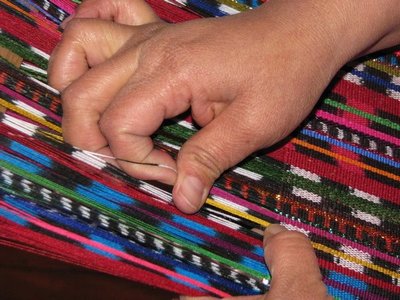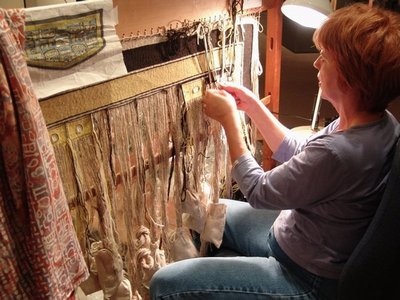September 30, 2010
Burke Museum to show off collection of hand-woven textiles in ‘Weaving Heritage’
The Burke Museum has been collecting international textiles for over a century and holds a permanent collection of over 2,000 hand-woven pieces. The Burke textile collection has been widely used for research, but most of these works have never before been on public display.
This fall, for the first time, 130 of the most beautifully designed and culturally significant textile masterpieces from the Americas, Asia, and the Pacific Islands will be displayed in a new Burke Museum exhibit, titled Weaving Heritage: Textile Masterpieces from the Burke Collection. The show will open Oct. 2 and run through Feb. 27, 2011.
Weaving Heritage will draw on the expertise of master weavers and cultural leaders from the communities represented in the exhibit to tell the story of this increasingly endangered art form. The exhibit will provide museum visitors with a rare opportunity to see outstanding examples of traditional textile arts from Indonesia, Micronesia, Japan, Mexico, Guatemala, China, Tibet, the Philippines, Southeast Asia, Bolivia, Peru, Chile, Ecuador, and Native American tribal groups including the Salish, Tlingit, Haida, Navajo, and Hopi.
The textiles will be complemented with examples of traditional looms, weaving tools, and touchable materials. A hands-on area will allow visitors to try simple weaving activities, handle fiber samples, and learn about weaving techniques through video and other resources.
For many thousands of years, people all over the world have woven animal and plant fibers into cloth. Hand-woven textiles are closely identified with cultural identity, ethnic pride, technical artistic mastery, and community history. However, in the past 150 years, factors such as the introduction of cheap, machine-made textiles, changes in the availability of traditional materials, the influence of foreign fashions, and economic and political strife in many nations have threatened the survival of hand-woven textile traditions.
In recent decades, some communities have witnessed a resurgence of their weaving heritage, as national governments provide support for training programs, microcredit and financing programs encourage small business development, and community weaving associations use the Internet to market their textiles and reach an international clientele.
Curator Emeritus James Nason, as lead curator for the project, said, “Weaving Heritage will offer the public a rare insight into the demanding nature of this endangered art, and the extraordinary quality and artistic beauty of the work of indigenous master weavers, while also expanding the Burke’s outreach to tribal and ethnic audiences.”
Related events
Throughout the duration of the exhibit, museum visitors will have opportunities to watch and talk with contemporary master weavers from a variety of indigenous cultures and learn about weaving and dyeing techniques, beginning with the opening weekend of the exhibition. Check www.burkemuseum.org/events for updates to the event calendar.
- Opening day activities, Saturday, Oct. 2, 10 a.m. to 4 p.m. — Come to the opening day celebration of Weaving Heritage, featuring guided exhibit tours, hands-on weaving activities for families, and an indigo dye demonstration with Seattle’s Earthues. Learn more about the opening day activities online here.
- Guatemalan backstrap weaving demonstrations with master weaver Maria Cuc Jiatz, Friday, Oct. 22, 10 a.m. to 3 p.m., Saturday, Oct. 23, noon to 3 p.m.; and Sunday, Oct. 24, 10 a.m. to 3 p.m. — Mayan weaver Maria Cuc Jiatz is dedicated to passing along the art of backstrap loom weaving to future generations. Meet Maria and watch as she demonstrates this traditional Mayan weaving technique.
- Guatemalan backstrap weaving master class with Maria Cuc Jiatz, Saturday, Oct. 23, 9 to 11 a.m. — Learn the backstrap weaving process from start to finish on a traditional Mayan backstrap loom. Cost: $40, plus $30 loom and supply fee payable directly to instructor. Class size is limited. To register, email burked@u.washington.edu or call 206-543-9681.




